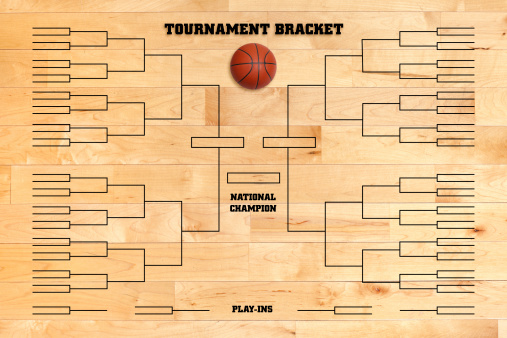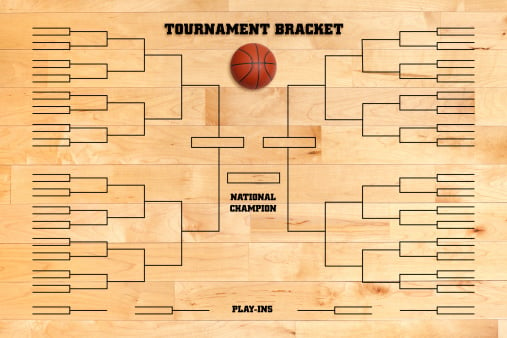 I'm not a super huge basketball fan - I like football better. My wife and her family, however, could be poster-models for why it's called "March Madness". I am a huge fan of great marketing though. So, since I know nothing about college basketball - and I'm required by my family-in-law to fill out a bracket - I figured I'd combine the two and rank my bracket based on who has the best grade on Marketing Grader.
I'm not a super huge basketball fan - I like football better. My wife and her family, however, could be poster-models for why it's called "March Madness". I am a huge fan of great marketing though. So, since I know nothing about college basketball - and I'm required by my family-in-law to fill out a bracket - I figured I'd combine the two and rank my bracket based on who has the best grade on Marketing Grader.
For those of you that don't know, Marketing Grader is a free tool that helps you understand how well your marketing is positioned to drive sales for your business. It factors in how well you're positioned to attract traffic to your website through content creation, social media marketing, search engine optimization, mobile optimization, etc. as well as how well your site is positioned to convert that traffic into contacts and turn those contacts into valuable customers. It takes all of these factors and combines it into a simple grade (0 being the worst and 100 being the best) that helps you know how well your inbound marketing machine is designed and what you could do to improve.
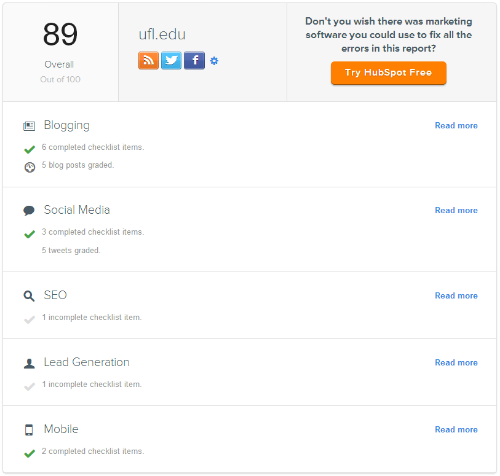
Multiple-Domain Disorder
This was particularly challenging for higher-education websites like those of universities, because they're guiltier than most of one of the deadly sins of marketing automation: Rather than using subdomains or subdirectories, they have an entirely different website for all the various faces of their organization. There's a website for the main university brand, a website for each campus, a website for each department, and oftentimes a website for each individual club within the athletics department (such as the basketball team).
I've heard all the excuses for this: The IT Department won't let us add content to the main site. We wanted more control over our website. We wanted to get what we thought were the SEO benefits of exact-match keyword domains.
Ecommerce companies are particularly guilty of that last one. Instead of having one site with a URL like "myecommercestore.com/productCategory" they do multiple websites like "productCategory1store.com" and "productCategory2store.com" hoping that if someone uses a search engine to find that exact product that they'll be more likely to show up. While this did, in fact, used to be very true (search engines assumed that if your site domain was "17inchlaptops.com" that you were a highly relevant result to show someone searching for the exact term 17 inch laptop), it's become increasingly counter-productive as search engines - particularly Google - have begun to heavily weight other factors.
What Matters In SEO
To back that up with some data, our friends over at SearchMetrics do an annual correlation analysis of what factors have the heaviest weightings in terms of websites ranking in the first 10 slots of a search engine results page. The heaviest factors, by far, that separate good websites from great websites that drives lots of sales are social signals (such as number of tweets) and content-oriented SEO factors such as inbound links. Search engines have caught on to the rampant spam that resulted from easily available exact-match domains, and they've adjusted by more heavily weighting other factors.
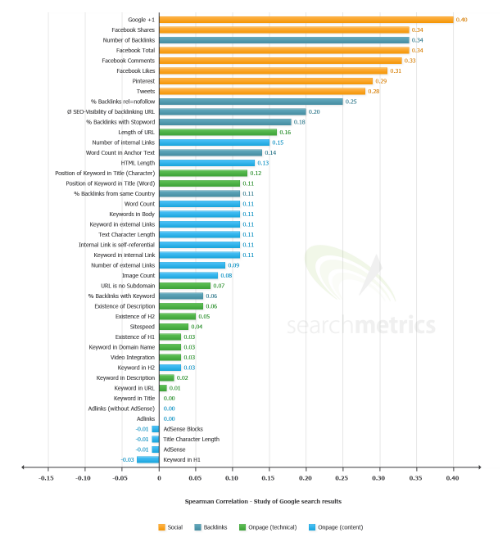
We know, intuitively, that if you and I both have websites about ecommerce marketing and every time you publish a blog article you get 5,000 tweets and I only get 10 that you're probably more authoritative, and search engines are quickly catching on to that lesson.
Concentrate Your SEO Efforts
A better modern inbound SEO strategy involves centralizing your SEO "juice" in a single domain. Concentration of force, an ancient military principle still applicable to SEO, helps you explain to search engines the entire context of your authority by centralizing the social sharing, inbound links, and other ranking factors into a single indexable brand identity. There may be as much water in a million puddles as in a lake, but no one labels a million puddles on a map.
SEO Mistakes Can Have Far-Reaching Consequences
Universities in March Madness may be more likely to choose multiple domains over single because of the procedural and bureaucratic IT issues associated with a large organization. For example, the basketball team may not want to have to submit a request to the IT department and wait two weeks for them to make changes if they have a high volume of incoming requests, and may decide to build a separate site simply because their marketing goals are less sales-related and driving traffic from search engines is a lower priority for them than being able to control their content.
However, this may hurt the admissions office in their marketing goals if the basketball team's website has lots of inbound links from powerful websites like ESPN and CBS and the admissions office loses that SEO "juice" when trying to rank for terms like "best college for balancing school and athletics".
Generic vs. Specific Brands
In additional to multiple domains, the universities in March Madness had the additional challenge of extremely generic brand names. If, as a search engine user, I'm trying to find information about "Kansas" as a contender, they have to compete with the Kansas government, Wikipedia articles about Kansas, CNN news articles about Kansas - not to mention the fact that almost every major state-named university has a huge number of unaffiliated schools with names that only vary in small ways - such as "Kansas College" vs. "Kansas State College" vs. "Kansas College Polytechnic" etc.
While there's not much that universities can do about this, ecommerce websites usually have more flexibility in brand identity. Instead of calling ourselves "ecommercemarketingsoftware.com", HubSpot has an independent identity that prevents us from having to compete against homonymic competitors. Although nonsense words like "Qwikster" may not be the right solution for your company based on the psychographic dimensions of your buyer personas, you should weight branding options against the ease with which competitors for your consumer's attention can rank alongside you.
My March Madness Bracket
Keep in mind that if you run any of these reports that the data may have changed or updated since I originally ran it for my analysis. Also keep in mind that I'm not a college basketball fan, and while I'm certain that I have the right website for "Gonzaga" I'm not at all sure I graded the right Kansas (see previous point around brand SEO).
You can see my entire bracket here. Unsurprisingly, our very own Harvard University had the highest score in Marketing Grader with a score of 91.
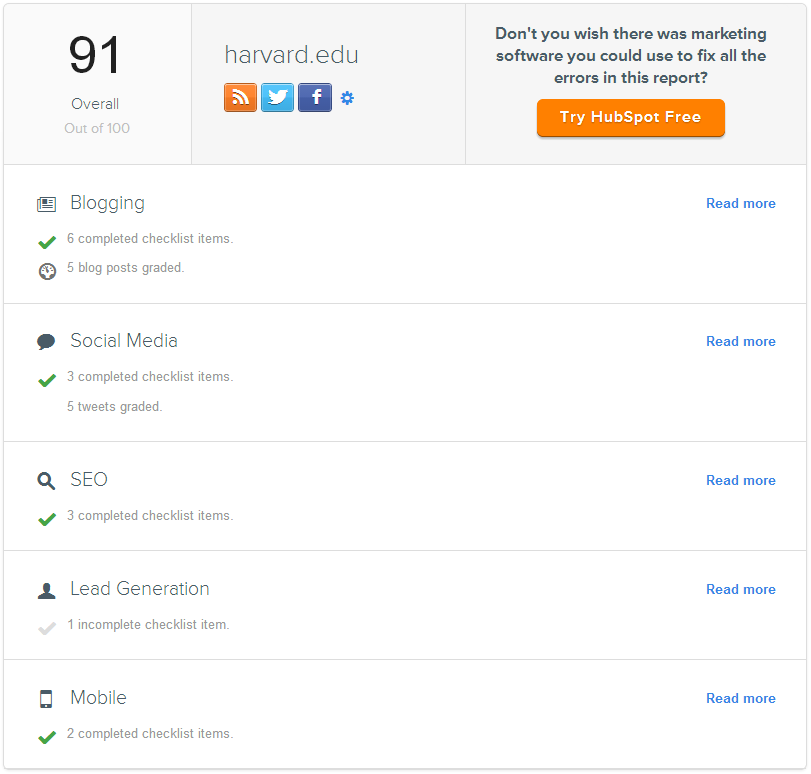
With this kind of powerful line up, they tore through some stiff competition, eventually coming up against Wisconsin with a score of 89 that - while very impressive compared with the rest of the field - couldn't stand up against the brainy crimson nerds:
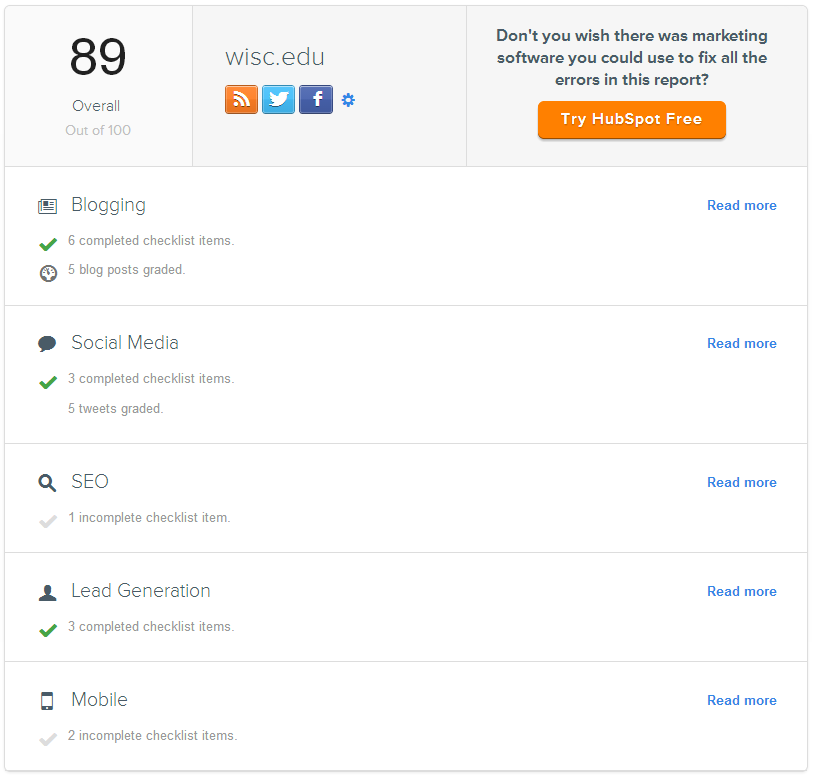
Have you checked your marketing grade? Although there are a number of factors in creating a revenue-driving ecommerce marketing campaign, you can learn from these SEO mistakes and win the SERP match ups that put you in the winner's circle.


